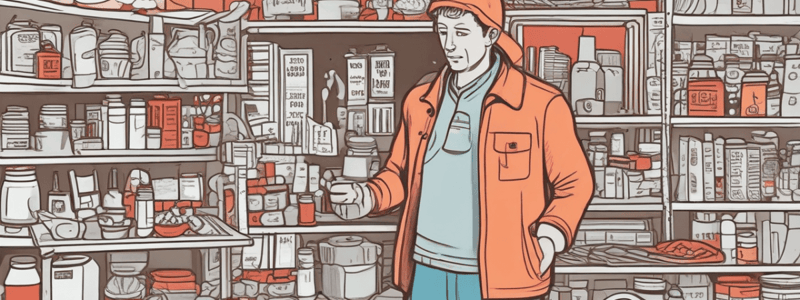Podcast
Questions and Answers
How much water should a household store per person per day to survive disasters?
How much water should a household store per person per day to survive disasters?
At least 1 gallon
What is the recommended duration of stored water supply in a household?
What is the recommended duration of stored water supply in a household?
At least 3- to 5-day supply
Why may children and breastfeeding women need more than 1 gallon of water per day?
Why may children and breastfeeding women need more than 1 gallon of water per day?
Because of their specific nutritional needs
What should be done to stored water every 6 months?
What should be done to stored water every 6 months?
What precaution should be taken when consuming bottled water during a disaster?
What precaution should be taken when consuming bottled water during a disaster?
What should be done to water stored in a bathtub before consumption?
What should be done to water stored in a bathtub before consumption?
Why is it important to store water in sturdy plastic bottles with tight-fitting lids?
Why is it important to store water in sturdy plastic bottles with tight-fitting lids?
What are the three ways to make water safe for consumption during a disaster?
What are the three ways to make water safe for consumption during a disaster?
What type of water can be used for personal hygiene needs, but not for drinking?
What type of water can be used for personal hygiene needs, but not for drinking?
What is the recommended storage duration for unopened canned or boxed foods?
What is the recommended storage duration for unopened canned or boxed foods?
Why should foods not be stored near gasoline, oil, paints, or petroleum-based solvents?
Why should foods not be stored near gasoline, oil, paints, or petroleum-based solvents?
How long can a full freezer maintain its cold temperature without electricity if the freezer door remains closed?
How long can a full freezer maintain its cold temperature without electricity if the freezer door remains closed?
Why should cooked foods be discarded after 2 hours at room temperature?
Why should cooked foods be discarded after 2 hours at room temperature?
What type of fuel is recommended for cooking during an emergency?
What type of fuel is recommended for cooking during an emergency?
Why should camp stoves or charcoal grills not be used indoors?
Why should camp stoves or charcoal grills not be used indoors?
What should be done to protect foods from rodents and insects?
What should be done to protect foods from rodents and insects?
What is the recommended duration for safely keeping refrigerated food during a power outage if the refrigerator door remains closed?
What is the recommended duration for safely keeping refrigerated food during a power outage if the refrigerator door remains closed?
What should be done to prevent food from absorbing odors during storage?
What should be done to prevent food from absorbing odors during storage?
Flashcards are hidden until you start studying
Study Notes
Preparing for Disasters
- Disasters like hurricanes and earthquakes can cause power outages, making it essential to have a supply of safe food and water.
Safe Water Supply
- Store at least 1 gallon of water per person per day, ideally 3-5 days' worth (5 gallons per person).
- Children, breastfeeding women, and people in warm climates may need more water.
- Store extra water for food preparation, personal hygiene, dishwashing, and pets.
- Keep stored water in a cool place, in sturdy plastic bottles with tight-fitting lids, and change it every 6 months.
- Use bottled, boiled, or treated water until the public water supply is safe.
- Additional sources of water include:
- Melted ice cubes from the freezer
- Canned fruit juices
- Water drained from an undamaged water heater
- Water stored in the toilet tank (not the bowl)
- Avoid drinking water from car radiators, home heating systems, or water beds.
Emergency Food Supply
- Store at least a 3-day supply of non-perishable food that:
- Has a long storage life
- Requires no refrigeration
- Can be eaten without cooking
- Examples of emergency food supply include:
- Canned meats, fish, fruits, and vegetables
- Canned fruit juices
- Unopened boxes of cereal, low-salt crackers, and trail mix
- Prewrapped fruit-filled granola bars
- Peanut or other nut butters
- Raisins and other dried fruit
- Store food in a cool, dry, dark place, and use a permanent marker to write the date on the package.
- Rotate food supplies every 2 years or before they reach their expiration dates.
Food Safety during Power Outages
- Refrigerated food can be safely kept for 4 hours without power, if the refrigerator door remains closed.
- A full freezer can maintain its cold temperature for 48 hours (24 hours if half full), if the door remains closed.
- Consume perishable food in the refrigerator or freezer before using emergency food supply.
- Discard cooked foods after 2 hours at room temperature.
Cooking during a Disaster
- To prepare meals safely, store:
- A camp stove or charcoal grill
- Fuel for cooking (charcoal)
- Matches
- Cooking and eating utensils
- Paper plates, cups, and towels
- Never cook food on a camp stove or charcoal grill indoors, as it can produce deadly carbon monoxide fumes.
Studying That Suits You
Use AI to generate personalized quizzes and flashcards to suit your learning preferences.




